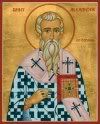"We received the letters which your love sent us and the booklet which contains the articles of your faith. We accept your love, and in compliance with your request we shall endeavor to clear the issues in which we agree and those in which we disagree" (Patriarch Jeremias II of Constantinople to the Tübingen theologians, writing on the Augsburg Confession in May 1576).Described by the author of the book review as "remarkable correspondence" and "unmistakable evidence that true Christian ecumenism is a centuries-old project."
"We ask your holiness to accept our reply with a glad countenance and a gentle spirit, to read it attentively and carefully…to scrutinize it commensurate with your own piety and wisdom in these great matters. We will piously and peacefully discuss the articles in dispute" (from the theologians' reply to the patriarch).
Now to clear up the false impression that this excerpt gives. It should be obvious that the "ecumenism" spoken of was a failure as the Tübingen "theologians" went on being their Lutheran selves. Here is another quote from the so-called "theologians": "If they [the Orthodox] wish to take thought for the eternal salvation of their souls, they must join us and embrace our teaching, or else perish eternally!" Finally after three letters and three rebukes of the "theologians" teaching Patriarch Jeremias asked them not to try and pawn off their beliefs: "Go your own way, and do not write any more on doctrinal matters; and if you do write, then write only for friendship's sake." Going a little deeper into the matter we learn that the whole correspondence was a set up, if you will.
The preface [to the Greek translation of the Augsburg Confession] is surely a red herring, serving to camouflage the real purpose of the enterprise. It is not a 'simple' translation; nor is it intended for intra-ecclesiastical purpose in Germany. The author is in fact adding much of his own..... The document is clearly an ecumenical overture to readers who are unfamiliar with the religious developments of sixteenth-century Germany. -Jorgensen, Augustana GraecaIf this didn't reveal to you the pompousness of said "theologians" maybe this quote from the horses mouth will:
As far as we know, we have both embraced and preserved the faith which has been handed down [to us] by the holy apostles and prophets, the God-bearing fathers and patriarchs, and the seven [ecumenical] synods that were built upon the God-given scriptures.Mr. "Theologian" evidently didn't realize that he was holding correspondence with one of said patriarchs... In Patriarch Jeremias' replies he emphasized that no one, even the enlightened "theologians" had a right to innovate...Patriarch Jeremias: "We reiterate these matters again, although we have been well-informed by your letters that you will never be able to agree with us or rather, we should say, with the truth."
we request that from henceforth you do not cause us more grief, nor write to us on the same subject if you should wish to treat these luminaries and theologians of the Church in a different manner. You honor and exalt them in words, but you reject them in deeds. For you try to prove our weapons which are their holy and divine discourses as unsuitable. And it is with these documents that we would have to write and contradict you. Thus, as for you, please release us from these cares.And yet the bombastic pompousness continues:
And even if you ask us to no longer trouble you with such writings (although we have conversed with you with much love and much kindness and with due respect) yet we are hopeful that the matters which have been written to you by us up to now will in time be re-examined and reconsidered more accurately and much better. ... Therefore, standing together with Your Holiness, Patriarch and Most Reverent Sir, we offer to the God of all, our true friendship which we have shown to you and which we will continuously afterwards keep.When do the "theologians" learn? and when will people learn that the only 'ecumenism' is entering into the One Holy Catholic and Apostolic Church?


No comments:
Post a Comment